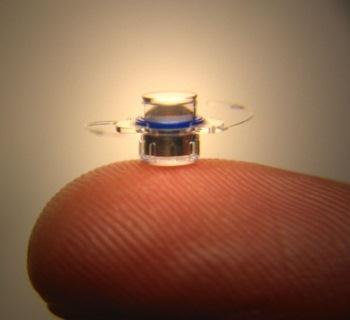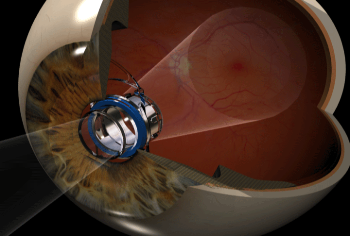In a first-of-its-kind procedure, physicians from the Virginia Commonwealth University Medical Center have successfully implanted a telescope in a patient’s eye to treat end-stage macular degeneration.

Telescope implant uses wide-angle micro-optics to improve vision for patients suffering from the most advanced form of macular degeneration.
Specifically, the implant is designed to correct AMD — age-related macular degeneration, the leading cause of blindness in older Americans. Those suffering from end-stage AMD have a central blind-spot, which makes it difficult or otherwise impossible to see faces, read instructions, and perform other daily activities like watch television, cook dinner, and take care of oneself.
“We are excited to provide this new surgical option to our advanced macular degeneration patients, who up until now have had limited options for improving vision,” said William H. Benson, M.D., a cornea specialist and chairman of the Department of Ophthalmology at the VCU School of Medicine, who also performed the procedure. “Advanced macular degeneration is a devastating disease, which cannot be treated by any available drugs or surgical procedures. The telescope implant offers a new hope for patients with limited vision.”
As for the technology within the implant, the telescope itself is smaller than a pea. It uses micro-optical technology to magnify images that would normally be seen in one’s central vision. These images are then projected onto the healthy portion of the patient’s retina, thereby making it possible for he or she to see the central vision object of interest.

The telescope implant projects the objects the patient is looking at onto the healthy area of the light-sensing retina not degenerated by the disease.
VisionCare Opthalmic Technologies, Inc. produced the telescope. Dr. Isaac Lipshitz designed it.
Story via: news.vcu.edu
Advertisement
Learn more about Electronic Products Magazine





